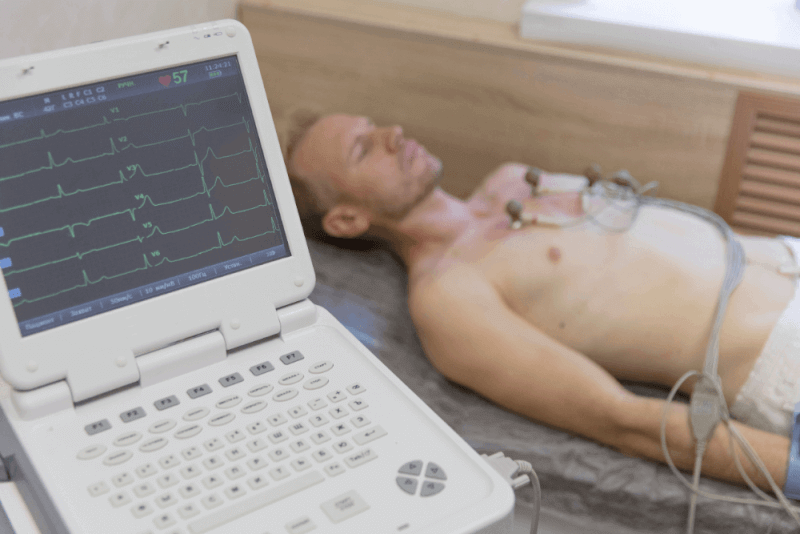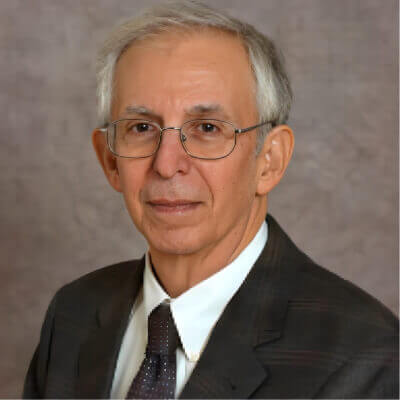Heart failure occurs when the heart is unable to pump enough blood to meet the body's needs, leading to various problems, including failure to perform basic bodily functions. If left untreated, it can be life-threatening.
30 Second Summary
- Heart failure can be defined as the inability to pump the necessary amount of blood to the body due to damage to the heart caused by various factors. The most common cause of heart failure is damage to the heart muscle, particularly caused by a heart attack.
- The most characteristic symptom of right-sided heart failure is the accumulation of fluid in the abdomen, lungs, lower back, feet, ankles, and legs. The accumulation area of the fluid varies depending on gravity.
- The most effective method used in diagnosing heart failure is echocardiography. In this test, sound waves are used to obtain a detailed image of the heart, allowing visualization of structural abnormalities and damage in the heart.
- Heart failure, which is a chronic disease, worsens over time. Therefore, there are stages of heart failure, starting from the risk of developing heart failure and continuing to advanced heart failure.
What is Heart Failure?
Heart failure can be defined as the heart's inability to pump enough blood to meet the body's needs due to damage caused by various factors. The most common cause of heart failure is damage to the heart muscle, particularly caused by a heart attack. Additionally, long-term hypertension, congenital heart muscle diseases, and heart valve diseases also contribute to heart failure.
Heart failure is a chronic disease and is also progressive. However, with proper medication, the disease can be managed and the heart muscle can be strengthened.
Symptoms of Heart Failure
People with heart failure experience symptoms because the heart cannot pump enough blood to meet the body's needs. These symptoms may develop gradually in some patients, while others may experience them suddenly. The symptoms of heart failure that can be observed include the following:
- Shortness of breath, both during activity and rest
- Fatigue
- Weakness
- Swelling in the ankles, feet, and legs
- Rapid or irregular heartbeats
- Inability to exercise as before
- Wheezing
- Persistent cough
- White or pink mucus, including blood-stained
- Bloating in the abdomen
- Rapid weight gain due to fluid retention
- Difficulty concentrating
- Increased need for sleep
- Chest pain when heart failure is caused by a heart attack
In addition to these symptoms, certain signs require immediate emergency medical assistance. Emergency symptoms include:
- Chest pain
- Shortness of breath
- Fainting
- Severe weakness
- Fainting accompanied by rapid or irregular heartbeats
- Sudden and severe shortness of breath
- Cough with white or pink, frothy mucus
While these symptoms may indicate heart failure, they could also signal other health issues. Therefore, patients should seek medical attention without self-diagnosing.
Moreover, the symptoms of heart failure may vary depending on whether it affects the right or left side of the heart. The most characteristic symptom of right-sided heart failure is edema (fluid retention) in the abdomen, lungs, lower back, feet, ankles, and legs. The accumulation of fluid depends on gravity. In people who stand for prolonged periods, edema accumulates in the feet and legs, while in those who lie down, it accumulates in the back. On the other hand, the most characteristic symptom of left-sided heart failure is shortness of breath.
How is Heart Failure Diagnosed?
Patients with symptoms of heart failure must first have their medical history reviewed. Following this, a physical examination is conducted, and a series of tests are performed to assess heart function.
The most effective diagnostic method for heart failure is echocardiography. In this test, sound waves are used to create detailed images of the heart, allowing the detection of structural abnormalities and damage to the heart.
During a physical examination, the doctor will assess areas where edema (swelling) has occurred, listen to the heart's rhythm, and examine any swelling in the neck veins.
Additionally, because some of the symptoms of heart failure can resemble those of other lung and heart diseases, patients are often required to undergo detailed tests to rule out these conditions.
Treatment of Heart Failure
Since heart failure is a chronic disease, it requires lifelong treatment. With regular treatment, a significant portion of patients can live a normal life.
Heart failure treatment reduces the likelihood of hospitalization and helps prevent sudden deaths among patients.
Angiotensin-Converting Enzyme (ACE) Inhibitors
One of the main groups of drugs used in the treatment of heart failure is ACE inhibitors. These drugs help strengthen the heart muscle and enable it to pump blood more effectively. These medications are often used for patients with weakened heart muscles, and they are a type of blood pressure medication.
Angiotensin Receptor Blockers (ARBs)
ARBs are another class of medications that work similarly to ACE inhibitors but are often used when patients experience side effects from ACE inhibitors. These medications help lower blood pressure and support heart function.
Beta Blockers
Beta blockers are effective in preventing life-threatening heart rhythm disturbances. They slow the heart rate and prevent the heart from enlarging, which allows the heart and its muscle to receive more oxygen and nourishment, thereby strengthening the heart muscle. These properties make beta blockers important in treating the symptoms of heart failure.
Diuretics
Diuretics, commonly known as water pills, help eliminate excess fluid from the body through the kidneys. This helps reduce the edema caused by heart failure and alleviates shortness of breath.
Regular monitoring of potassium and sodium levels is important during the use of diuretics to ensure their safe and effective use.
Digoxin
Digoxin increases the contraction strength of the heart and also slows down the heart rate. It is often prescribed to patients with heart failure who also have heart rhythm disturbances.
In addition to the medications mentioned above, cholesterol-lowering drugs and blood thinners may also be included in the treatment plan. Despite the complexity of using multiple medications, it is crucial that patients follow their prescribed regimen for successful treatment.
Even with regular medication, patients may still experience worsening symptoms and may need hospitalization. In such cases, oxygen therapy and intravenous medications are administered to stabilize the patient.
Surgical Treatments and Medical Support Devices
In some cases, surgical methods are also used to treat heart failure. Surgical treatments for heart failure include the following:
Coronary Artery Bypass Surgery
When heart failure is caused by severe coronary artery disease, coronary bypass surgery is performed to restore oxygenated blood flow to the heart muscle.
Valve Replacement or Repair
In cases where heart failure results from heart valve diseases, surgery may be performed to repair or replace the damaged valve. If valve problems are diagnosed early, treatment can be performed before heart failure develops.
During valve replacement, the diseased valve is replaced with a mechanical or biological prosthetic valve through microsurgery.
Implantable Cardioverter Defibrillators (ICD)
ICDs are used in cases of dangerous heart rhythm disturbances. This device delivers an electrical shock to the heart to restore normal rhythm. If the patient’s heart rhythm slows too much, the ICD can increase the heart rate as well.
Cardiac Resynchronization Therapy (CRT) or Biventricular Pacemaker
Heart failure patients often experience problems related to the electrical system of the heart, which further damages the heart muscle. A pacemaker is used to address this issue, enabling the heart chambers to work together in a coordinated manner.
Heart Pump
A heart pump is used to support a weakened heart and is implanted into the abdominal and chest cavities. It is especially used in patients with left ventricular failure. The aim of the heart pump is to keep the patient alive until a heart transplant can be performed.
Heart Transplant
In advanced stages of heart failure, both medication and surgical treatments are insufficient. In these cases, a heart transplant is necessary.
Stages of Heart Failure
Heart failure, being a chronic condition, worsens over time. For this reason, it is classified into stages, ranging from the risk of developing heart failure to advanced stages of the disease.
Stage 1 Heart Failure
Stage 1, also known as Stage
Surgical Treatments and Medical Support Devices
In some cases, surgical methods are also used to treat heart failure. Surgical treatments for heart failure include the following:
Coronary Artery Bypass Surgery
When heart failure is caused by severe coronary artery disease, coronary bypass surgery is performed to restore oxygenated blood flow to the heart muscle.
Valve Replacement or Repair
In cases where heart failure results from heart valve diseases, surgery may be performed to repair or replace the damaged valve. If valve problems are diagnosed early, treatment can be performed before heart failure develops.
During valve replacement, the diseased valve is replaced with a mechanical or biological prosthetic valve through microsurgery.
Implantable Cardioverter Defibrillators (ICD)
ICDs are used in cases of dangerous heart rhythm disturbances. This device delivers an electrical shock to the heart to restore normal rhythm. If the patient’s heart rhythm slows too much, the ICD can increase the heart rate as well.
Cardiac Resynchronization Therapy (CRT) or Biventricular Pacemaker
Heart failure patients often experience problems related to the electrical system of the heart, which further damages the heart muscle. A pacemaker is used to address this issue, enabling the heart chambers to work together in a coordinated manner.
Heart Pump
A heart pump is used to support a weakened heart and is implanted into the abdominal and chest cavities. It is especially used in patients with left ventricular failure. The aim of the heart pump is to keep the patient alive until a heart transplant can be performed.
Heart Transplant
In advanced stages of heart failure, both medication and surgical treatments are insufficient. In these cases, a heart transplant is necessary.
Stages of Heart Failure
Heart failure, being a chronic condition, worsens over time. For this reason, it is classified into stages, ranging from the risk of developing heart failure to advanced stages of the disease.
Stage 1 Heart Failure
Stage 1, also known as Stage A, is characterized by the absence of heart failure symptoms in patients. However, a family history of heart failure and certain pre-existing conditions increase the risk of developing heart failure. The following conditions are associated with an increased risk of heart failure:
- Hypertension
- Use of cancer drugs that may harm the heart muscle
- Diabetes
- Family history of cardiomyopathy
- Coronary artery disease
- History of rheumatic fever
- Metabolic syndrome
- History of alcohol addiction
Stage 2 Heart Failure
At Stage 2, patients do not yet experience heart failure symptoms, but the left ventricle may not be functioning properly or there may be structural abnormalities in the heart.
Stage 3 Heart Failure
Stage 3 heart failure is when patients are diagnosed with heart failure, and symptoms of the condition become evident.
Stage 4 Heart Failure
Stage 4 is the most advanced stage of heart failure. This stage is characterized by the severe deterioration of heart function, and the condition is often referred to as end-stage heart failure. Even with treatment, symptoms of heart failure persist and worsen.
Mortality Rates in Heart Failure
Since 1959, numerous studies have been conducted to track the mortality rates in heart failure patients, and the results show a significant reduction in these rates over time. The studies include one-month, one-year, three-year, and five-year mortality data. For example, between 1959 and 1969, the mortality rate for male heart failure patients was 70%, and for females, it was 57%. However, between 1990 and 1999, this rate dropped to 59% for males and 45% for females.
In studies conducted between 1995 and 1997, the six-month mortality rate averaged at 26%. By the years 2004-2005, it had decreased to 14%. The research shows an increase in survival rates between 1991 and 2001. In this period, the survival rates increased by 5% at one month, 10% at one year, and 9% at five years.
Current studies show that people with heart failure live about 10 years less than those without the condition. The following survival rates have been established in recent studies:
- The survival rate within the first year after diagnosis is between 80% and 90%.
- The survival rate within the first five years after diagnosis is between 50% and 60%.
- The survival rate within the first 10 years after diagnosis is about 30%.
Death Symptoms in Heart Failure
The presence of end-stage heart failure significantly increases the risk of death within the next 6 to 12 months. The common symptoms observed in the final stages of heart failure include the following:
- Pain
- Cognitive disorders, including speech, memory, or language problems
- Shortness of breath with minimal exertion or even at rest
- Insomnia and other sleep disorders
- Persistent cough
- Edema
- Extreme fatigue
- Loss of appetite
- Nausea
- Limited physical activity
- Constipation
- Depression
- Anxiety
Heart Failure and Lung Fluid Accumulation
Pulmonary edema, or fluid accumulation in the lungs, is a common issue associated with heart failure. When the heart is unable to effectively pump blood, it causes the blood to back up into the pulmonary veins. This increased pressure in the lungs' vessels leads to fluid buildup, which restricts the movement of oxygen in the lungs and causes shortness of breath.
Some of the medical conditions that can cause fluid buildup in the lungs as a result of heart failure include:
Coronary artery disease, which narrows the arteries that supply oxygenated blood to the heart muscle, leading to left ventricular weakness. In some cases, blood clots in the arteries can reduce blood flow, damaging part of the heart muscle and causing a heart attack. These conditions can lead to heart failure.
Heart Failure and Edema
Edema is a common complication seen in heart failure patients. Although it is not immediately dangerous, the location and severity of edema are critical in understanding the progression of heart failure.
The most dangerous type of edema in heart failure is pulmonary edema, which causes shortness of breath and a persistent cough. However, typical edema caused by heart failure tends to occur in the lower body, particularly in the abdomen, legs, and feet.
While edema can occur throughout the body, it is most commonly found in the abdominal area, legs, and feet. The presence of edema does not necessarily indicate that the heart failure is severe, but as the disease progresses, the severity of edema tends to increase.
How to Reduce Edema in the Feet
The primary goal in treating edema caused by heart failure is to manage the underlying heart condition. In addition, the fluid levels in the body must be controlled. The following medications can help manage fluid buildup:
- Diuretics to remove excess fluid from the body
- Medications to relax blood vessels and reduce the effects of heart failure
- Medications to lower blood pressure and reduce blockage in blood vessels
- Medications to slow the heart rate and allow the heart to relax
Along with medications, the following methods can help reduce edema in the legs and feet:
- Wearing compression stockings to promote better circulation in the legs
- Engaging in regular exercise
- Raising the legs and feet above heart level
Who is at Risk for Heart Failure?
Heart failure can affect individuals of all ages and genders, but it is more common in men at younger ages. Several factors increase the risk of developing heart failure, including the following:
- Being over the age of 65
- A family history of heart failure
- Genetic factors
- Smoking
- Consumption of high-cholesterol foods
- Excessive salt intake
- Alcohol dependency
- Substance abuse
- Having any form of heart disease
- Serious lung diseases
- Obesity
- Sleep apnea
- Chronic kidney diseases
- Iron deficiency
- Cancer treatment
Important Considerations for People with Heart Failure
People with heart failure need to be treated throughout their lives. While rare, some patients can experience an improvement in their heart failure over time. Key factors that those with heart failure need to be mindful of include:
Maintaining a Healthy Weight
It is important for people with heart failure to maintain a healthy weight. If a person gains 2-3 kilos in just a few days, it may indicate fluid retention, which suggests that the condition is worsening. In this case, the dosage of diuretic medications should be adjusted accordingly. Conversely, individuals with heart failure may also experience unintended weight loss due to insufficient energy intake, immobility, and the inability of the heart to pump blood adequately, which can lead to the loss of muscle mass.
Reducing Salt Intake
One of the most important steps in preventing fluid buildup (edema) in heart failure patients is reducing salt consumption. This can be done by removing salt from tables and visible places, consuming healthy foods such as fruits, vegetables, and fish, and avoiding processed foods.
Balanced Fluid Intake
Heart patients should aim to consume between 1.5 and 2 liters of fluids daily. This amount includes not only water but also tea, coffee, fruit juices, soda, and herbal teas. To prevent excessive fluid intake, small glasses should be used, and fluids should be consumed slowly.
Quitting Alcohol
Alcohol consumption raises blood pressure and increases the heart rate. Therefore, heart failure patients should limit their alcohol intake to no more than two drinks a day. One drink is equivalent to one bottle of beer or a glass of wine. In more severe cases of heart failure, it is advisable to avoid alcohol entirely.
Balancing Potassium Intake
Diuretics used to treat heart failure can lead to potassium deficiency. Therefore, these medications should be adjusted, and patients should eat foods rich in potassium. If a patient's potassium levels are too high, they may need to follow a potassium-restricted diet. It is also important to manage cholesterol levels by consuming unsaturated fats instead of saturated fats.
Living with Heart Failure
Thanks to more effective treatments, heart failure patients today can live longer, healthier lives compared to 50 years ago. Moreover, many people with heart failure can still engage in most of the activities they enjoy.
Engaging in Regular Exercise
Regular exercise helps manage heart failure and improves overall health. However, before starting or changing an exercise routine, it is crucial to consult with a doctor to ensure the exercise does not put excessive strain on the heart. All exercises should start with warm-up activities and end with cool-down exercises. Walking is generally considered the safest exercise for heart failure patients. Those who already walk regularly may progress to other activities like cycling or swimming. If shortness of breath, cold sweats, nausea, or chest pain occurs during exercise, it should be stopped immediately.
Quitting Smoking
Smoking contributes to many heart and vascular problems, including reduced oxygen-carrying capacity of the blood, plaque buildup in the arteries, and increased blood pressure. To prevent these effects, it is essential for heart failure patients to quit smoking.
Traveling
People with heart failure can travel short and medium distances without issue. However, long trips that require prolonged sitting can lead to edema and cramps in the legs and feet. Therefore, it is important to move around regularly during long trips.
There is no restriction on driving for heart failure patients, unless their condition is associated with fainting or a loss of consciousness. In some countries, however, people with heart failure are not allowed to drive. It is important to check local regulations when traveling abroad.
Work Life
Individuals with heart failure can often continue working for many years and full-time. However, the intensity of their work and the stage of their illness may affect their ability to continue in certain roles. Some patients may need adjustments in their work hours and responsibilities. It is also recommended for working individuals to get flu and pneumonia vaccinations to prevent respiratory infections, which can worsen heart failure.
Sexual Life
If heart failure is well-controlled, patients can maintain a normal sexual life. The following recommendations can help maintain a healthy sexual life:
- Choose a stress-free, relaxed, and rested time for sexual activity.
- Avoid engaging in sexual activity right after heavy meals or alcohol consumption.
- Ensure that the environment is neither too hot nor too cold.
- If you experience fatigue or shortness of breath during intercourse, stop immediately.
- Consult a doctor if erectile dysfunction occurs.
What is Decompensated Heart Failure?
Decompensated heart failure occurs when the heart's function deteriorates to the point that it cannot pump blood at the required physiological pressure. This can be caused by functional or structural changes in the heart. Decompensated heart failure is a serious condition that requires immediate medical intervention and is considered an epidemiologically significant problem.
Decompensated heart failure can dramatically affect the clinical outcomes of a patient, and timely treatment is critical to managing the condition effectively.
Heart Failure Stages
Heart failure is a chronic condition, and its clinical picture worsens over time. As a result, there are different stages of heart failure, ranging from an increased risk of developing the condition to advanced heart failure.
Stage 1: At Risk
Stage 1, also known as Stage A, indicates that the patient does not yet have heart failure. However, if the patient has a family history of heart failure or certain risk factors, their risk of developing heart failure is higher. The following conditions may increase the risk of heart failure and are considered in Stage A:
- Hypertension
- Use of certain cancer drugs that damage the heart muscle
- Diabetes
- Family history of cardiomyopathy
- Coronary artery disease
- History of rheumatic fever
- Metabolic syndrome
- History of alcohol dependence
Stage 2: Mild Symptoms
In Stage 2, the patient may not yet show signs of heart failure, but the left ventricle may not function well, or there could be an anatomical abnormality present.
Stage 3: Moderate Heart Failure
In Stage 3, the patient has been diagnosed with heart failure. Symptoms associated with heart failure are present at this stage, and the condition may require more intensive treatment to manage.
Stage 4: Advanced Heart Failure
Stage 4 represents the final stage of heart failure, where the condition has progressed to advanced stages. Another term often used for Stage 4 is "reduced ejection fraction heart failure," indicating that the heart is unable to pump blood effectively. Despite treatment, patients at this stage may continue to experience severe symptoms.
Heart Failure Mortality Rates
Studies on heart failure mortality rates have been conducted since 1959, and they continue to evolve. The most notable finding in these studies is the significant reduction in mortality rates. Research has focused on one-month, one-year, three-year, and five-year mortality rates. For example, between 1959 and 1969, the mortality rate for male patients with heart failure was 70%, while for women, it was 57%. However, during the 1990-1999 period, these rates decreased to 59% for men and 45% for women.
In a study conducted between 1995 and 1997, the mortality rate for heart failure patients was 26%, but by 2004-2005, it had decreased to 14%. The survival rates for heart failure patients increased from 1991 to 2001, with survival rates improving by 5% in the first month, 10% in the first year, and 9% over five years.
Currently, research shows that people with heart failure have a survival rate 10 years shorter than those without the condition. In recent studies, the survival rates for heart failure patients have been determined as follows:
- Survival rate in the first year after diagnosis is between 80% and 90%
- Survival rate in the first five years is between 50% and 60%
- Survival rate within the first 10 years is about 30%
Heart Failure Death Symptoms
The presence of end-stage heart failure indicates an increased risk of death within 6 to 12 months. Common symptoms in end-stage heart failure include:
- Pain
- Cognitive impairments related to speech, memory, or language
- Shortness of breath even with minimal effort or at rest
- Sleep disturbances, including insomnia
- Persistent cough
- Swelling (edema)
- Extreme fatigue
- Loss of appetite
- Nausea
- Limited physical activity
- Constipation
- Depression
- Anxiety
Heart Failure and Pulmonary Edema
Pulmonary edema is often a complication of heart failure. When the heart is unable to efficiently pump blood, the blood returns to the veins leading to the lungs. This causes an increase in pressure within the lung's vessels, which compresses the alveoli and impairs oxygen exchange. This leads to shortness of breath.
Several medical conditions contribute to the development of heart failure-induced pulmonary edema, including:
Coronary artery disease, which causes plaque buildup in the arteries supplying blood to the heart muscle, leads to weakening of the left ventricle. In some cases, blood clots form in the arteries, impairing blood flow and causing heart muscle damage, resulting in a heart attack. These conditions contribute to heart failure development.
Heart Failure and Edema
Edema is a common complication of heart failure. While not inherently dangerous, the location and severity of the edema are important indicators of the severity of heart failure.
The most dangerous form of edema in heart failure is pulmonary edema, which causes shortness of breath and coughing. However, the typical edema caused by heart failure tends to be in the lower parts of the body, such as the abdomen, legs, and feet.
Though edema can occur in various parts of the body, it usually concentrates in the abdomen, legs, and feet. The presence of edema does not necessarily indicate advanced heart failure, but as the condition progresses, the severity of the edema can increase.
How Does Edema in the Feet Go Down?
The primary goal in treating edema caused by heart failure is controlling the heart failure itself. Additionally, managing fluid levels in the body is crucial. Several medications can assist in this process:
- Diuretics, which help eliminate excess fluid from the body
- Medications that relax blood vessels and reduce the effects of heart failure
- Drugs that lower blood pressure and reduce blockages in the vessels
- Medications that slow the heart rate and help the heart relax
In addition to medications, the following methods can help alleviate edema in the legs and feet:
- Using compression stockings to improve blood circulation in the legs
- Regular physical exercise
- Raising the legs and feet above heart level
Who is at Risk for Heart Failure?
Heart failure can affect individuals of all ages and genders. However, it is more commonly observed in men at a younger age. The risk of developing heart failure increases with age, and certain factors contribute to its development, including:
- Being over 65 years old
- A family history of heart failure
- Genetic factors
- Smoking
- Diet high in cholesterol
- Excessive salt consumption
- Alcohol addiction
- Substance abuse
- Presence of heart disease
- Serious lung diseases
- Obesity
- Sleep apnea
- Chronic kidney disease
- Iron deficiency
- Cancer treatment
Considerations for Individuals with Heart Failure
Individuals with heart failure must be under continuous medical supervision throughout their lives. While rare, some patients with heart failure may experience improvement in their condition. Important points for individuals with heart failure to consider include:
Maintaining a Healthy Weight
It is essential for people with heart failure to maintain a healthy weight. If a patient gains 2-3 kilograms in a short period, it is a sign of fluid retention, and the clinical condition is worsening. In this case, the dosage of diuretic medications should be adjusted. On the other hand, individuals with heart failure may be prone to weight loss due to reduced energy intake and muscle mass loss from limited physical activity and inadequate heart function.
Reducing Salt Intake
One of the most critical steps in managing edema caused by heart failure is reducing salt intake. To achieve this, it is recommended to remove salt from tables and visible locations. Consuming healthy foods such as fruits, vegetables, and fish, and avoiding processed foods, helps in reducing salt intake.
Balanced Fluid Intake
Heart failure patients are advised to consume 1.5 to 2 liters of fluid daily. This includes not only water but also tea, coffee, fruit juices, soft drinks, and herbal teas. To regulate fluid intake, it is advisable to use smaller cups and consume liquids slowly.
Abstaining from Alcohol
Alcohol consumption increases blood pressure and heart rate. For individuals with heart failure, it is recommended to limit alcohol intake to no more than two drinks per day. A standard drink is equivalent to a bottle of beer or a glass of wine. In cases of severe heart failure, it is advised to refrain from alcohol completely.
Balancing Potassium Intake
Diuretic medications used in heart failure treatment can cause potassium deficiency. In such cases, medication adjustments are necessary, and patients should focus on consuming foods rich in potassium. If potassium levels are elevated, potassium-restricted diets should be followed. Additionally, managing cholesterol levels is important, and it is advised to consume unsaturated fats as much as possible.
Living with Heart Failure
With advancements in the treatment of heart failure, patients today enjoy longer and higher quality lives compared to those from 50 years ago. Furthermore, individuals with heart failure can continue to perform many of the daily activities they desire.
Regular Exercise
Engaging in regular exercise helps manage heart failure and also benefits overall health. However, before starting or changing an exercise routine, it is essential for heart failure patients to confirm with their doctor whether the exercise will put excessive strain on their heart. All exercise routines should begin with warm-up exercises and end with cool-down movements. Walking is the most suitable form of exercise for heart failure patients. Those already walking regularly may consider cycling or swimming. Exercise should be done 1-2 hours after eating, and if any signs such as shortness of breath, cold sweats, nausea, or chest pain occur, the exercise should be stopped immediately.
Quitting Smoking
Smoking causes numerous cardiovascular problems, including reduced oxygen-carrying capacity of the blood, plaque buildup in arteries, and increased blood pressure. Quitting smoking is essential for preventing these negative effects and improving overall heart health.
Traveling
Heart failure patients can travel short and medium distances without issue. However, long journeys that require prolonged sitting can cause edema and cramps in the legs and feet. It is recommended that patients move regularly during long trips to prevent these issues.
There is no general restriction on driving for heart failure patients. However, if a patient has a history of arrhythmia leading to fainting or loss of consciousness, driving is not recommended. Some countries have laws restricting heart failure patients from driving, so international travel may require further research on these regulations.
Work Life
Many individuals with heart failure can continue working full-time for many years. However, the intensity of the work and the stage of the disease may affect their ability to perform certain tasks. In some cases, adjustments in work hours or job responsibilities may be necessary. Additionally, it is recommended that individuals with heart failure who are employed receive flu and pneumonia vaccinations to avoid complications.
Sexual Life
As long as heart failure is well-managed, patients can maintain a healthy sex life. The following tips can help improve sexual health for individuals with heart failure:
- Engage in sexual activity when feeling relaxed, stress-free, and well-rested.
- Avoid sexual activity immediately after a heavy meal or alcohol consumption.
- Ensure the environment for sexual activity is not too hot or cold.
- If any fatigue or shortness of breath is experienced during intercourse, it is important to stop.
- Consult a doctor if erectile dysfunction occurs.
What is Decompensated Heart Failure?
Decompensated heart failure refers to the inability of the heart to maintain adequate blood pressure due to structural or functional changes in the heart. In this condition, the heart can no longer pump blood effectively to meet the body's needs. This situation requires urgent medical intervention and is of significant clinical and epidemiological importance.
Conclusion
Heart failure is a serious, chronic condition that requires careful management to maintain quality of life and reduce the risk of complications. With proper medical care, including medication, lifestyle changes, and regular monitoring, patients can continue to lead fulfilling lives. Early detection and treatment are crucial, and patients should work closely with their healthcare providers to develop a comprehensive care plan tailored to their specific needs.
It is important for individuals with heart failure to understand their condition and the necessary steps to manage it. With the right treatment, education, and lifestyle modifications, heart failure patients can live longer, healthier lives. Always follow medical advice, adhere to prescribed treatments, and make the necessary changes to improve overall heart health.
If you or a loved one are experiencing symptoms of heart failure, consult a healthcare provider immediately to determine the appropriate treatment options and prevent further complications.















